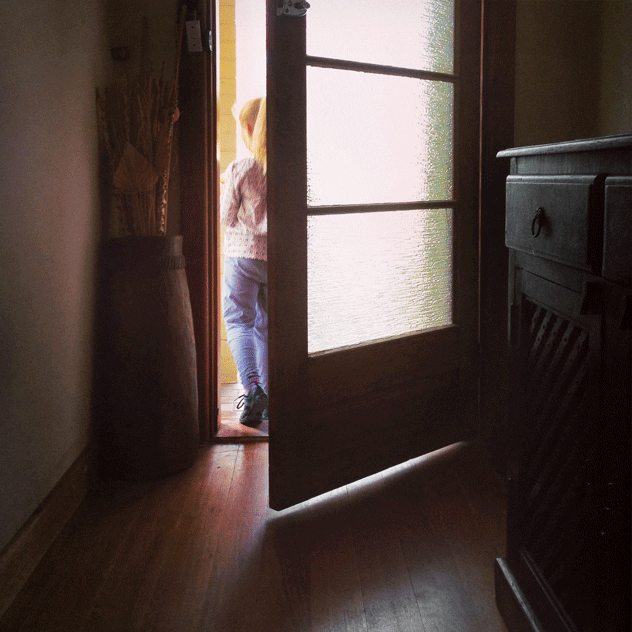*Sarah Martin is a pseudonym.
Normally, when my father was raging, I lay frozen in my bed, staring into the darkness and straining to hear what was happening. Just once, I wriggled out of my bedroom window and went running up the street in my pyjamas. I had no plan. I didn’t know where I was going, or to whom. There was only one thought in my head: Get help. I was nine years old.
I banged on the door of a house on the corner, rousing the occupants from sleep. Standing on the doorstep in my bare feet, I told these strangers through my sobs, “My father is hitting my mum and my sister, please call the police.”
It was 1979. ‘Domestics’, these events were called, and the police were notably reluctant to get involved. My family had to be pretty desperate to call for help – you couldn’t count on the police showing up to what society generally considered to be a private and embarrassing matter.
In the strained lull of the days that followed, Mum made me retrace my steps to the people I had begged for help. Once I’d found the house again, I handed the woman at the door an envelope – and in some hazy, childish way, I realised she thought it contained money. Rather, it was a handwritten plea from my mother not to speak about what happened.
Nobody talked to me.
I was the youngest child, an introverted, socially unskilled little girl, whose entire childhood refuge involved disappearing into books. As an adult, I look back and wonder why my two older siblings and I did not close ranks. But my father’s abuse was not limited to lashing out with his fists – the way he shamed and bullied my brother and sister set us all at odds with one another. Remembering that night still has the power to make me tremble inside. But as I look back over four decades, I can see clearly what I couldn’t then. The shame and silence (and the confusion they created) were as harmful as the violence itself.
It was not until I trained as a volunteer with Women’s Refuge in my early twenties that I realised just how much I had normalised the violence I grew up with. The punishment my father meted out to my brother was criminal, but in my home it passed as ordinary parental discipline.
There’s an image – a fragment of narrative – that haunts me still. I was very small, because my legs still swung against the dining room chair, not touching the ground. My father loomed over my brother, whom he’d just backhanded so hard my brother’s chair had toppled straight backwards to the floor. “Didn’t I tell you not to bite your fork?” he roared.
What haunts me most is not our father’s outrageous overreaction, or even my brother’s fear and pain; it’s that I kept on eating, head down. Don’t draw attention to yourself, pretend it’s not happening. With no way to remove myself physically, I got good at internally disassociating from what was happening around me. ‘Splitting’, the therapist I began seeing in my forties, called it.
Did my brother ever confide in anyone, or ask for help? A friend? A teacher? The parents of the friends whose homes he spent as much time in as he could? I don’t know – we don’t talk about it. He told me once that he has no recollection at all of his childhood. Nothing. There’s just a blank where memories of school, friends, parties and soccer games should be. I don’t want to ask him anything that might breach that wall.
As a child, I tried to make sense of it on my own. I stuck close to home, stayed by my mother’s side. She was the sole point of safety and security around which I orbited. Who was there to talk to? I wasn’t very good at making friends with my peers. And as for adults, there were no visitors to our house. I never sat down to a meal with people who weren’t my family. Just twice during my first 10 years, we hosted my mother’s extended family for our Christmas Day gathering. There was no-one else. (My father’s family lived on the other side of the world and didn’t know us, or the kind of man he’d become).
And how was I going to talk to Gran, when my own mother wasn’t able to speak to her about what she was enduring? The tragedy is that my mum had grown up with an angry, unpredictable, bullying father – and then married a man a lot like him. My grandmother endured her fraught, loveless marriage for seven long decades because of a tight-lipped Methodist view that having made one’s bed, one must lie in it. By such aphorisms, both suffering and the endurance of that suffering are handed down, from one generation to another.
At least it stops with us, but I am only sure of that because neither my siblings nor I have had children (or married). I haven’t been burdened with a strong biological instinct for mothering, but I am sad that I never felt I had a choice, such was my secret understanding that I’d be a terrible mother. Indeed, raising a puppy in recent years confirmed that. I was distraught to discover my reactivity, the rage that would blow up out of nowhere when this wriggling, wilful creature wouldn’t do as he was told.
Obedience was prized above all else in my family; arguably, my father confused it with love. Regardless, obedience became the strategy I clung to. It largely worked in terms of escaping physical violence, although I was lucky that Mum finally left him just before I turned 10, before I became pubescent and surly.
For a long time, I carried a story that I was the lucky one who had escaped my dad’s anger. Certainly that’s what my siblings believe – a wedge between us still. It took therapy, and the current climate of openness around family violence, to finally unpick the idea that I was unharmed.
I recall the horror I felt when I first heard of the Jesuit adage: “Give me a boy until he is seven, and I will show you the man.” I’m fucked, I remember thinking, sick in my stomach. Witnessing violence significantly impacts children – even if they are not the target of it, the mental health implications are similar. Groundbreaking research in the ’90s suggested family dysfunction, including witnessing one’s mother being abused, was a significant risk factor for physical as well as mental illness in adulthood. Merely the fear of being hit is usually enough to keep someone in line – certainly, I learned to be very ‘good’ by observing the consequences for my older siblings when they didn’t do as they were told.
My mum later told me that the final impetus to leave her marriage came when just the sound of my father’s car pulling into the driveway made her stomach turn over with fear. My brother could recognise Dad’s car by the way he changed down through the gears at the roundabout a block away. We’d all learned to be hypervigilant.
Our neighbours knew what was happening, but in 1970s New Zealand, a man’s home was his castle. No-one ever came to our aid, not at the time of my father’s drunken rages and not afterward. ‘Don’t get involved’ was the mantra of the times, from the police down. Mum was never sympathetically approached by a neighbour gently asking, ‘Are you okay?’.
The two times the police did belatedly show up, there was never any consequence for my father or follow-up for the family. The wise and patient therapist I began seeing in my forties encouraged me to imagine the little girl that I was and to talk to her, and to listen. I tell her she’s okay, that things get better. You’ll live with Mum and you won’t have to be scared. Friends are waiting for you when you get a bit bigger. Your sister will stop being so mean. You’re not ugly. I tell her through my tears that things have changed. Bad things still happen but now people care and they stick up for kids like you. Like us.
In the space of a half-century, domestic violence has been brought out of the shadows. It’s been named, and called out for what it is: abuse, unacceptable, criminal. Not okay here. Legislation introduced in 1995 saw domestic violence described in law and gave protection orders some teeth. There are public information campaigns and massive training programmes that span government and other agencies.
Notably, many of the calls to my town’s Women’s Refuge crisis line now come from the police themselves, calling on behalf of women and children who need support. The police show up now. They take family violence seriously: in word and, it seems, in deed.
Women’s Refuge began in the early 1970s as an informal network of safe houses. Now it does much more advocacy work with women in their own home because legislation and police practice have shifted. Nowadays, it’s usually the case that the abusers have to find somewhere else to go, while the women and kids stay in familiar surroundings, shielded by short and longer-term legal mechanisms. A new programme, the Whanau Protect National Home Safety Service, pays for beefed-up home security and monitoring for women at risk.
This concerted, networked response across agencies has developed because New Zealand has an epidemic of violence in the home. One in three women in this country have experienced violence (including sexual assault) at the hands of their partner, and the incidents reported to police are increasing every year.
In 2016, NZ police investigated nearly 119,000 incidents of family violence. It took more than 40 per cent of their frontline officers’ time. No-one working in the field can be sure if more violence is happening or if it’s just more likely to be reported. What’s agreed on is that there is far more violence than is reported to the police. The National Collective of Independent Women’s Refuges (NCIWR) holds firmly to its roots, working to support women and children experiencing violence. Meanwhile, other services are trying to build fences at the top of the cliff, working with perpetrators of violence in facilitated men’s groups and intensive programmes for couples.
For example, Aviva in Christchurch and Shine in Auckland both run programmes for men who use violence (Shine calls theirs “No Excuses”) and offer specialist help for kids. Shine also offers educational programmes in workplaces and schools. To have an adult I could talk to about what I was witnessing and feeling, or to hear people openly speak about what happened in my home? I can’t fathom what a difference that would have made for me as a child.
My mother still doesn’t talk about it much. She’s had serious mental health issues in recent years, and a counsellor she saw one time believes Mum has post-traumatic stress disorder because of the violence. Just occasionally, and never with any warning, some anger will erupt and she’ll talk about him (“your father…”). It leaves me shaken; I don’t want to know more than I already do.
But there’s no-one else to listen. And so I do.
In 2016, police investigated close to 119,000 incidents of family violence.
TACKLING VIOLENCE IN THE HOME
Concerned that someone you know is being harmed at home? For information on services to contact, or ideas on how to start a conversation with someone at risk, visit www.2shine. org.nz or areyouok. org.nz. Please call the police if you or someone else is in immediate danger.
HEALING THE SCARS
My father is still alive, diminished by ill health and suffering the onset of dementia. I’m no longer frightened of him. He takes no responsibility for his estrangement from us, his children. I will not visit my father at home. He still lives in the house I grew up in, and the memories overwhelm me when I step inside. I dread having to clear out the place when he dies. But I will, and I will not ask my brother and sister to help. As a little girl, I couldn’t protect any of us. But at least now, that much I can spare them.







